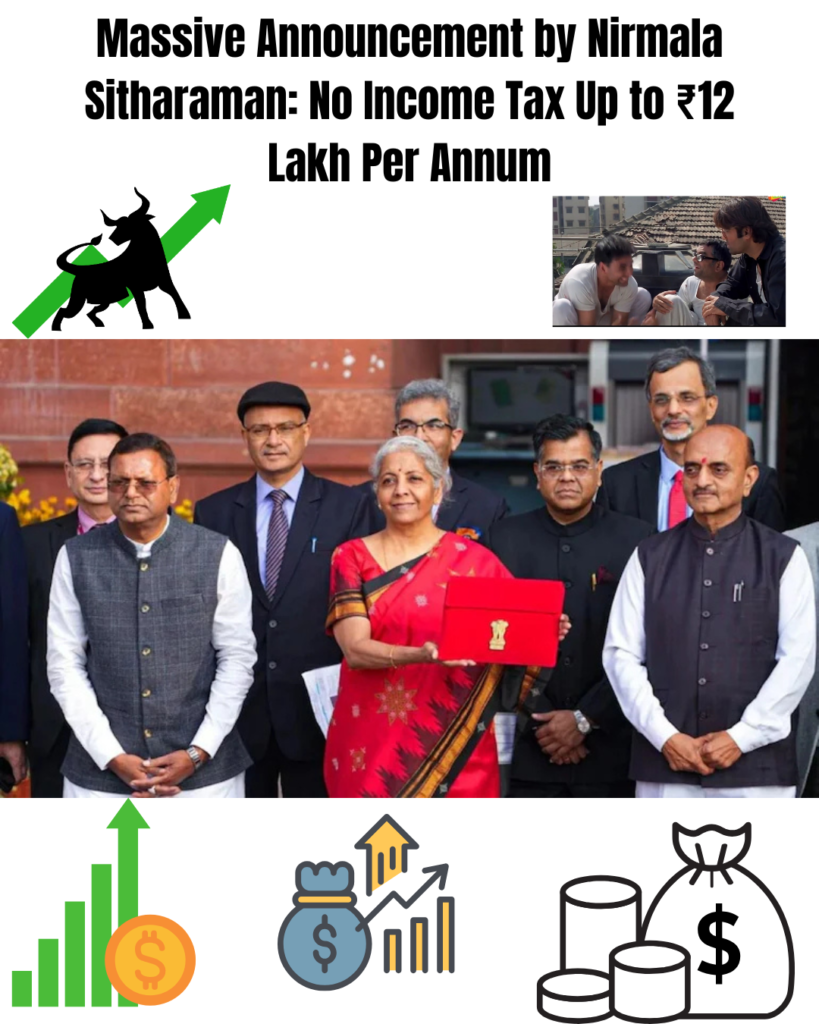In a historic move, Finance Minister Nirmala Sitharaman has unveiled a game-changing reform in India’s income tax structure. During the latest Union Budget 2025 announcement, she declared that individuals earning up to ₹12 lakh per annum will no longer have to pay income tax. This bold initiative is expected to benefit millions of middle-class taxpayers and significantly boost disposable income, leading to higher consumer spending and economic growth.
Key Highlights of the Income Tax Reform
1. Higher Income Tax Exemption Limit
Previously, the income tax exemption limit was capped at ₹7 lakh under the new tax regime. With this new announcement, taxpayers earning up to ₹12 lakh annually will enjoy complete income tax exemption, significantly reducing their tax burden.
2. Enhanced Disposable Income for Middle-Class Taxpayers
This tax relief will leave more money in the hands of salaried professionals, self-employed individuals, and small business owners, promoting higher spending and savings. Increased disposable income can lead to improved investment in real estate, stock markets, and retirement funds.
3. Economic Growth & Fiscal Implications
By increasing the exemption limit, the government aims to boost economic activity by encouraging consumer spending. Although the move will reduce direct tax collections, the government expects indirect tax revenue to rise due to higher consumption. Additionally, the Centre has reassured that fiscal discipline will be maintained, with the fiscal deficit projected to be reduced to 4.4% of GDP from the earlier estimate of 4.8%.
4. New Tax Regime to Become More Attractive
The government’s decision to enhance the exemption limit under the new tax regime makes it more appealing compared to the old regime, where deductions and exemptions played a crucial role. The simplification of tax slabs is expected to encourage more taxpayers to shift towards the new tax system, reducing complexities in filing returns.

Impact on Various Sectors
1. Boost to the Stock Market & Investment Opportunities
With higher disposable income, retail investors may allocate more funds toward stock market investments, mutual funds, and other financial instruments. This could result in increased participation in stock trading and portfolio diversification.
2. Real Estate Sector to Witness Higher Demand
A rise in disposable income often translates into increased demand for real estate. Homebuyers, especially first-time buyers, may find it easier to invest in residential properties due to higher affordability.
3. Increased Consumer Spending & Retail Growth
As more money flows into the economy, industries like automobiles, electronics, tourism, and luxury goods may witness higher sales, leading to job creation and overall economic expansion.
Expert Opinions on the New Income Tax Slabs
Financial analysts and tax experts have largely welcomed this announcement, considering it a progressive step toward tax relief and economic stability. Many believe that raising the exemption limit will motivate taxpayers to declare their income transparently, potentially increasing compliance rates.
According to leading economists, this tax relief could serve as a crucial step in India’s economic revival post-pandemic, ensuring sustainable growth while keeping inflation in check.
What Should Taxpayers Do Next?
- Review Tax Planning Strategies – With the new exemption limit, individuals must reassess their tax planning approach, especially those who previously relied on deductions under the old tax regime.
- Increase Investments – With more disposable income, consider investing in equity markets, real estate, and government schemes to maximize wealth accumulation.
- Utilize Savings Wisely – Instead of unnecessary expenditures, taxpayers should look at long-term financial planning, including retirement savings, insurance, and emergency funds.
Conclusion
Nirmala Sitharaman’s announcement of raising the income tax exemption limit to ₹12 lakh per annum marks a turning point in India’s tax policy. The move is expected to provide a massive financial boost to middle-class earners, stimulate economic activity, and simplify the taxation system. As this policy rolls out, taxpayers must stay informed and adapt their financial planning strategies to make the most of this tax relief.
This revolutionary change is bound to reshape India’s economic landscape, empowering millions of citizens and setting the foundation for a stronger financial future.
Also learn about Top Stocks to Buy Before Union Budget 2025.
Stay tuned for more updates on tax reforms, investment strategies, and stock market trends on our website.
